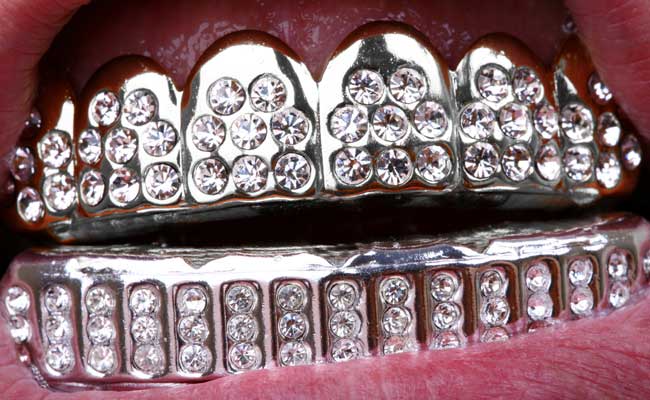Dental Consumer Products Overview: Denture Products
If you have dentures, or even if you haven’t, chances are you’ve seen TV advertisements for denture products. Because dentures and teeth loss can be emotional topics, it’s no surprise that the advertisements try (let’s call them) unconventional approaches. Sometimes they try too hard to be funny, sincere, or authoritative. Other times they go for realness and end up somewhere closer to too-much-information.
But for all their flaws, these ads are speaking to a sizable market. Over 60 million people in the US lack teeth, and according to the Journal of Prosthetic Dentistry, there will be 37.5 million people wearing full dentures by 2020. For people with dentures, consumer products on the market attempt to address two primary needs:
- Keeping dentures clean
- Keeping dentures in your mouth (preferably comfortably!)
Cleaning products come in a few varieties. Martha Raye, denture wearer, advocated for a brand of dissolving tablets that killed bacteria and remove stains. There are also pastes, much like toothpaste, that patients can use to brush their dentures—once the dentures are safely out of your mouth. Ultrasonic cleaning appliances can remove stains from dentures, although they are more expensive and also require the use of a special cleaning fluid. For patients concerned with chemical cleansers, homemade solutions using lemon juice, vinegar, or baking soda can all help remove stains and re-whiten dentures.
Denture adhesives include pastes or gels that come in a tube, like toothpaste and adhesive strips. These adhesives are meant to keep dentures in patients’ mouths comfortably while eating and talking.
Dentures are meant to fit comfortably in the mouth—and not require adhesives—because they are molded specially to the patient’s jawbone and palate. However, without teeth anchored in the jaw, the bone deteriorates over time, and its shape changes. This eventually leads to dentures that don’t fit, or that cause discomfort, requiring adhesive. Even cleaning dentures, which requires them to be removed from the mouth, could conceivably cause patients to experience negative feelings.
However, changes in dental technology can reduce these issues for patients. Fixed implant dentures use dental implants to secure replacement teeth permanently to the jaw. Patients can brush them in their mouth, just like teeth, and the implants themselves help the jawbone avoid further deterioration. Although implants do tend to be more expensive than traditional dentures, for many they are an appropriate, life-long solution to their dental needs.
Whether you’re looking for the best way to take care of your dentures or you’re considering whether implants might be a better solution for you, we’d love to talk to you. Call your Lancaster, CA dentist today at 661.952.7865 for an appointment to find out more!
More
Five Signs You Might Have Sleep Apnea… and One Thing You Can Do About It
At one point in time, maybe even only a few years ago, sleep apnea was not well-known among the public. Now, thankfully, public awareness of sleep apnea is much higher. After all, it is a dangerous condition, and because it is a disease that affects sleep, many people who have sleep apnea aren’t even aware of it.
If you suffer from sleep apnea, you will temporarily stop breathing during the night—up to hundreds of times! The health implications are quite serious, as sleep apnea is linked to many cardiovascular diseases, including high blood pressure, heart failure, stroke, and heart arrhythmias. So if you have sleep apnea, it’s important to get treatment.
So what are some signs or risk factors for sleep apnea?
- You’re overweight.
Body weight is linked to obstructive sleep apnea, which is caused by tissues in the upper throat collapsing, constricting the flow of air to the lungs. Heavier people can have tissue built up around their neck and throat; these tissues fall back and obstruct the airway when they’re lying down.
- You have high blood pressure.
When you stop breathing during an episode of sleep apnea, less oxygen gets to your brain. Since your brain needs to maintain sufficient oxygen levels at all times, this can lead to spikes in blood pressure as your body tries to compensate for low oxygen levels by pumping more blood, faster, to your brain.
- You’re often tired during the day.
Even if you think you’re getting plenty of sleep at night, you probably aren’t if you’re suffering from apnea. Not only do the interruptions detract from the amount of sleep you’re getting; they also detract from the quality of sleep. If you have difficulty waking up in the morning, feel tired all day long, need frequent naps, or doze off on occasion, you might have apnea.
- You’re frequently irritated, depressed, or prone to mood swings.
If you’re not getting enough sleep, it can quickly have an impact on your mood. Your body releases cortisol, a hormone that causes stress, if you’re sleep deprived. This means you might end up feeling anxious, irritable, or just out of sorts frequently.
- You snore.
If your spouse or significant other tells you that you snore, or if your snoring wakes you up, then that’s a good sign you might have sleep apnea. In fact, snoring is the most common sign of sleep apnea.
And now, for one thing you might not know about sleep apnea: there are treatment options other than a CPAP machine. In fact, if you have sleep apnea, you can call your dentist for help. There are simple oral appliances (mouth guards) that can position your jaw in such a way that it keeps your airway open during the night.
So if you’re concerned about sleep apnea, you might just want to talk to your Lancaster, CA dentist about it next time you’re in the office for a check-up. Call Douglas B. Weber, DDS at 661.952.7865 today, and we’ll be happy to help!
More
By admin
15 Aug, 2017
Cosmetic Dentistry, Dental Health, Dental Hygiene, Dental Tips, General Health, Lifestyle, Oral Health
caring for dental grills, dental grills, dental history, gold teeth, grillz

A Brief History of Grills
“I got my mouth looking something like a disco ball
I got the diamonds and the ice all hand set
I might cause a cold front if I take a deep breath
My teeth gleaming like I’m chewing on aluminum foil”
– Grillz, Nelly (featuring Pall Wall & Ali & Gipp)
Grills (or grillz) are, if not popular, at least fairly recognizable these days. Made of precious metals (gold and platinum being the most common) and often studded with diamonds, most grills are removable and worn over the front teeth. But where do they come from?
Although many people would point to Nelly and his 2005 song, “Grillz,” as the starting point for the trend, they’re actually much older than that. (And no, we’re not just talking about rappers like Slick Rick, Flavor Flav, and Big Daddy Kane from the 80s and 90s, either). We’re talking ancient history.
In ancient Italy, between 800 and 200 BC, wealthy Etruscan women wore teeth woven together with gold wire the thickness of a rubber band. The wire held together teeth that had been removed and were placed back into the mouth, so they made eating difficult. The practice wasn’t necessarily common, but archaeologists found documentation of around 20 sets of teeth woven together in this way. Etruscan civilization vanished as the Romans took over Italy, and this fashion trend died with it.
In Latin America, Mayans actually cut small holes into their teeth and filled them with precious stones, typically jade. Again, this was a trend that only royalty and the wealthy could afford. Although the Mayan civilization has disappeared, many people in southeastern Mexico, Belize, Honduras, and Guatemala still wear gold tooth jewelry today.
In ancient Filipino myths, the creator of the world, a deity named Melu, had gold teeth—and during what was the Middle Ages in Europe, Filipinos were filing down their teeth and decorating them with gold. Some of these decorations included gold bands that covered the entire front row of teeth; the oldest date to around 1300 AD.
As the Renaissance began in Europe, dentistry was becoming more scientific and less superstitious—and Giovanni de Arcoli, a 15th century Italian professor of medicine, became the first author known to recommend filling cavities with gold to preserve them.
Grills started appearing in rap and hip hop videos in the 80s, and became even more popular as Southern rap began to take off in the 90s and early 2000s. And now, they’ve jumped into mainstream culture, as celebrities like Madonna, Miley Cyrus, Katy Perry, and even Ryan Lochte have sported them in recent years.
You might expect a dentist to come out against grillz as a health hazard, but no studies have proven that they’re bad for your teeth. As long as they’re removed and the teeth are brushed and flossed as appropriate, they shouldn’t cause health problems. Some metals can cause irritation; if it causes a rash, or bleeding, or other problems, just stop. Similarly, don’t clean them with anything toxic to ingest (like most jewelry cleaners), and don’t try to attach them permanently to your teeth with glue. But if you want to wear a grill, and you use some common sense and take care of your teeth, you’ll be part of a long tradition of dental jewelry.
We can’t recommend a jeweler to create your grill, but if you have any questions about dental instruments—either ornamental or for health reasons—please give us a call at (661) 952-7865 and we’ll be happy to answer your questions.
More
By admin
18 Mar, 2017
Dental Health, Dental Hygiene, Dental Tips, General Dentistry, General Health, Lifestyle, Oral Health
cavities, gingivitis, gum disease, plaque, tartar, teeth cleaning
Why do I Need Professional Teeth Cleanings?
Let’s look at five reasons why you should get your teeth regularly cleaned.
1. We check for oral cancer
With cancer, the sooner it’s detected the better chance you have of successfully getting rid of it. Oral cancer is no different. During each teeth cleaning, we check for any signs of oral cancer.
2. Cleanings help prevent cavities
Brushing and flossing every day will do wonders in maintaining a healthy mouth. But, sometimes you may forget to floss, or maybe you had a few too many sodas and candy bars. Our dental hygienists will ensure that your mouth is free of plaque, and can also give you tips for your at-home cleaning if they see something you may not be doing.
3. Cleanings help prevent gum disease
Gum disease can easily creep up on anyone. It is often painless until it becomes a bigger problem. When diagnosed with gingivitis, it can still be reversed with proper gum maintenance.
Once gingivitis progresses to periodontal disease, it requires ongoing professional care to prevent further damage to your mouth. Professional cleanings at twice a year drastically reduce the risk of gum disease ever starting.
4. Having a healthy mouth contributes to a healthy life
Poor oral health has been connected with diagnoses for diabetes, heart disease and pregnancy complications. Keeping your gums and teeth healthy will help prevent the occurrence of these diseases.
5. Regular cleanings are cheaper than taking care of oral problems
Receiving two professional cleanings a year may be an expense you don’t like to see. However, teeth cleanings are much cheaper than other procedures, such as root canals, scaling and root planing, and dental implants.
There is nothing better than a freshly cleaned mouth! Our dental hygienists will make sure you have pain free experience, and you can leave knowing you’ve taken a giant leap forward in maintaining a healthy smile.
If you have more questions about our professional teeth cleanings, or if you’d like to schedule an appointment, please call your Lancaster dentist at (661) 952-7865.
More
Imagine you are eating a big, juicy steak cooked to perfection. You cut out a chunk of steak place it in your mouth. The first bite is delicious, and the second bite is even better.
But then, in your fervor for chewing, you forget where the steak ends and where your cheek begins. Before you know it–chomp!–a bite that was intended for that tasty piece of steak caught your cheek. It’s painful and irritating, but you can get past the pain.
The next day, your wound is healing well, but unfortunately during lunch you bite down on it again. Now it’s official: you have a full blown canker sore. While not all canker sores are self-inflicted, it’s good to know what causes canker sores and some remedies you can implement to promote healing while reducing pain.
For the most part, canker sores are more of a nuisance than a health issue. They can appear on the inside of your lips, cheeks and on your tongue. They can either be caused by trauma (like biting on the inside of your cheek or braces irritating your mouth) or other factors like stress and the types of food you eat.
Avoid agitating your canker sore
- Try not to hit it with your toothbrush.
- Steer clear of foods that will annoy your canker sore, including crunchy, dry, or acidic foods–especially citrus!
- If you have braces, apply wax where the canker sore comes in contact with them. If your braces or dentures continue to cause discomfort and canker sores, your dentist may be able to make the proper adjustments to fix the issue.
Since most canker sores go away on their own, the best thing you can do is manage the pain
- Gargle with salt water. Mix about ¼ to ½ teaspoons of salt with eight ounces of warm water. Put about two to three ounces of water into your mouth at a time and swish it around for 20-30 seconds, then spit it out. Continue to do this until all of the water is gone.
- Consider using a local numbing agent. Products like Oragel can be applied to the canker sore and numb it for temporary relief. These types of products contain benzocaine, so please read all cautions before applying.
- Take over-the-counter pain relief medication, like ibuprofen.
If your canker sore doesn’t heal within a few weeks, it’s time to see a dentist. If your canker sore makes it too painful to eat or drink, consider seeing your dentist before the three week mark. Make an appointment with your local Lancaster dentist if you think you may need additional canker sore treatment.
More





